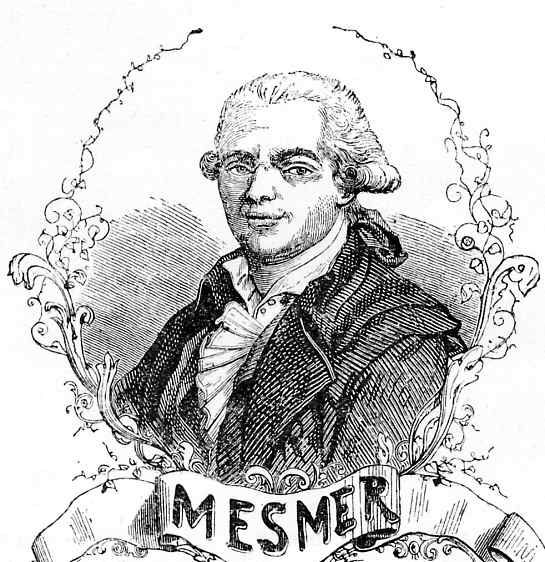The Commissionaire's Reports Into The Effectiveness and Existence of Mesmerism

Above is a historical illustration of Franz Anton Mesmer (image courtesy Wikipedia Creative Commons - http://upload.wikimedia.org/wikipedia/commons/6/6c/Mesmer.JPG
There were three reports submitted by the Commissionaires...
The first report found in favor of Mesmer and Animal Magnetism; so the Royal Society refused to publish it, and another two were quickly requested one for the French Royal Society of Medicine, and one for the King. The report presented to the King was much more damning than the one presented to the Royal Society of Medicine.
Knowing the King would be offended the Commissionaires focused strongly on the supposition that women more easily taken sexual advantage of when they were magnetized. After the French Revolution there were several more reports that favorably proclaimed magnetism and its curative properties. Mesmer's name was never mentioned in any of these later testaments.
The effect of the first report was instantaneous and remarkable. The advocates of magnetism, as a therapeutic agent, and the believers in the occult features of the phenomena, such as clairvoyance and thought-transference, had scored a triumph. But it served only to exasperate the average scientist and to intensify his prejudices. The other members of the Academy were against the committee. An outcry was raised on all sides. The sanctuary of science became an arena in which the passions were let loose. The Academy refused to have the report printed, only a few lithographed copies being supplied to those who asked for it, and it rests to this day in silent oblivion in the manuscript archives of the institution. Another committee was soon after appointed, being composed of avowed enemies of magnetism, and headed by a member who had openly sworn hostility to the doctrine. The result was what might have been expected. After the examination of two subjects under circumstances which, in the light of what is now known, rendered failure inevitable, the committee made a very undignified report in 1837, announcing the failure to produce the occult phenomena promised, and impugning the intelligence of the former committee. The third report, in 1837, practically killed mesmerism in France for a great number of years.
Report 1
Conclusions of the first Report of the Royal Academy of Medicine of France in 1831
"The contact of the thumbs or of the hands, frictions, or certain gestures made at a short distance from the body, and called passes, are the means employed to connect, or, in other words, to transmit the action of the magnetizer to the magnetized."
"The means which are external and visible are not always necessary, since, on several occasions, the will, fixedness of stare, have sufficed to produce magnetic phenomena, even without the knowledge of the magnetized."
"Magnetism has acted on persons of different sexes and different ages."
"The time necessary to transmit and communicate the magnetic action has varied from one hour to a minute." "Sleep brought on with more or less readiness, and established to a degree more or less profound, is a real but not a constant effect of magnetism."
"We are satisfied that it has been excited under circumstances where those magnetized could not see, and were ignorant of the means employed to occasion it. "Magnetism has the same intensity, it is as promptly felt, at the distance of six feet as of six inches, and the phenomena developed by it are the same in the two cases." "The action at a distance does not seem capable of being exercised with success, except on individuals who have been already subjected to magnetism."
"During the process of magnetising, insignificant and momentary effects manifest themselves sometimes, which we do not attribute to magnetism alone; such as slight oppression, heat or cold, and some other nervous phenomena, which may be accounted for without the intervention of a particular agent, namely, through hope or fear, prejudice, and the expecting of something strange and new, the ennui occasioned by the monotony of the gestures, the silence and calm observed during the experiments, and, finally, through the imagination, which exercises so great a dominion over certain minds and certain organisations."
"A certain number of the effects observed have seemed to us to depend on magnetism alone, and are not reproduced without it. These are well attested physiological and therapeutical phenomena." "We have not seen that a person magnetized for the first time fell into a state of somnambulism; sometimes it was not till the eighth or tenth sitting that somnambulism declared itself." "We have constantly seen ordinary sleep, which is the repose of the organs of the sense, of the intellectual faculties, and of the voluntary movements, precede and terminate the state of somnambulism." "We may conclude, with certainty, that this state exists, when it occasions the development of new faculties, which have received the denominations of clairvoyance, intuition, internal prevision; or when it produces a great change in the physiological state, as insensibility, a considerable and sudden increase of strength, and when this effect cannot be attributed to any other cause." "When once a person has been made to fall into a magnetic sleep, there is not always a necessity to have recourse to contact, and to passes in order to magnetize anew. The look of the magnetizer, and his will alone, has the same influence on the person. In this case, one may not only act on the person magnetized, but even put him completely into somnambulism, take him out of it without his knowledge, out of his sight, at a certain distance, and through closed doors."
"There usually occur changes, more or less remarkable, in the perceptions and faculties of those individuals who fall into a state of somnambulism by the effect of magnetism." "Some, amid the noise of confused conversations, hear only the voice of their magnetizer; several answer with precision the questions put to them either by the latter or by the persons near them; others hold on conversations with all the persons around them; however, they seldom understand what passes around them. "Most of the time they are entirely strangers to the external and unexpected noise made in their ears, such as the sound of copper vessels forcibly struck, the fall of any heavy substance, etc."
"The eyes are closed; the eyelids yield with difficulty to the efforts made with the hand to open them. This operation, which is not without pain, allows one to see the eyeball convulsed and directed towards the upper and sometimes towards the lower part of the orbit." "Sometimes the sense of smell is, as it were, abolished. One may make them respire hydrochloric acid or ammonia, without their being inconvenienced by it, or without even suspecting it. The contrary occurs in certain cases, and they are sensible to odors."
"Most of the somnambulists that we have seen were completely insensible. One might tickle their feet, nostrils, and the angle of the eyes by the approach of a feather, pinch their skin so as to produce ecchymosis, prick them under the nails with pins put in to a considerable depth, without their evincing any pain or being at all aware of it. In a word, we have seen one person who was insensible to one of the most painful operations of surgery, and whose countenance, pulse, and respiration, did not manifest the slightest emotion."
"Whilst they are in this state of somnambulism the magnetized persons we have observed retain the exercise of the faculties which they have while awake. Their memory even appears to be more faithful and more extensive, since they remember what has passed during all the time, and on every occasion that they have been in the state of somnambulism." "On their awakening they say that they have entirely forgotten all the circumstances connected with the state of somnambulism, and that they never remember them again. With respect to this point we can have no other surety than their own declarations."
"We have seen two somnambulists distinguish with their eyes shut the objects placed before them; they have told, without touching them, the color and value of the cards; they have read words traced with the hand, or some lines of books opened by mere chance. This phenomenon took place even when the opening of the eyelids was accurately closed by means of the fingers."
"We met in two somnambulists the power of foreseeing acts of the organism more or less distant, more or less complicated. One of them announced several days, nay several months beforehand, the day, the hour, and the minute when epileptic fits would come on and return; the other declared the time of the cure. Their previsions were realized with remarkable exactness." "Considering that magnetism is a generator of physiological phenomena, and a therapeutic agent, it must find its place in the syllabus of medical subjects, and medical men only should practice it, or watch and superintend its employment."
The report concluded with the following address to the members of the Royal Academy:
"The Commission having arrived at the termination of its labors before the closing of this Report, asked itself whether amid all the precautions with which they had surrounded themselves to avoid all surprise; whether with the feeling of constant distrust with which they had always proceeded, they, in the examination of the phenomena observed by them, had scrupulously performed their duty. What other course, said we to ourselves, could we have followed?" With what distrust more marked or more cautions could we have been influenced?
Our conscience, gentlemen, has answered us aloud that you could expect nothing from us which we have not done. Then have we been honest, accurate, faithful observers? It is for you who knew us for so many years, for you who see us constantly either in public life or in our frequent meetings, to answer this question. Your answer, gentlemen, we expect from the old friendship of some of you, and from the esteem of all."
"Certainly we do not presume to make you share our conviction regarding the reality of the phenomena observed by us, and which you have neither seen, nor followed, nor studied with us and as we did." "We do not; then, claim from you a blind credence in all that we have reported. We conceive that a considerable portion of these facts are so extraordinary, that you cannot grant it to us; probably we ourselves would presume to refuse you ours, if you came to announce them at this tribunal to us, who, like you, had neither seen, observed, nor studied any of them." "All we require is that you judge us as we should judge you; that is, that you would be convinced that neither the love of the marvelous, nor the desire of celebrity, nor any interest whatever has guided us in our labors. We were animated by motives of a loftier character, more worthy of you-by the love of science, and by the necessity of justifying the hopes which the Academy had entertained of our zeal and devotion."
Report 2
"The commissioners have ascertained that the animal magnetic fluid is not perceptible by any of the senses; that it has no action, either on themselves or on the patients subjected to it. They are convinced that pressure and contact effect changes which are rarely favorable to the animal system and which injuriously affect the imagination. Finally they have demonstrated by decisive experiments that imagination apart from magnetism produces convulsions, and that magnetism without imagination produces nothing.
They have come to the unanimous conclusion with respect to the existence and utility of animal magnetism, that there is nothing to prove the existence of the animal magnetic fluid; that this fluid, since it is non-existent, has no beneficial effect; that the violent effects observed in patients under public treatment are due to contact, to the excitement of the imagination, and to the mechanical imitation which involuntarily impels us to repeat that which strikes our senses.
At the same time they are compelled to add, since it is an important observation, that the contact and repeated excitement of the imagination which produces the crisis may become hurtful; that the spectacle of these crises is likewise dangerous, on account of the imitative faculty which is a law of nature; and consequently that all treatment in public in which magnetism is employed must in the end be productive of evil results."
(Signed) B. Franklin, Majault, Le Roy, Sallin, Bailly, D'Arcet, De Bory, Guillotin, Lovoisier." "Paris, August 11, 1784."
Report 3
"The commissioners entrusted by the king with the examination of animal magnetism have drawn up a report to be presented to his Majesty which ought perhaps to be published. It seemed prudent to suppress an observation not adapted for general publication, but we will not conceal this from the kings' minister. This minister has charged us to draw up a note designed only for the kings' eyes."
This important observation concerns morality. The commissioners have ascertained that the chief causes of the affects ascribed to animal magnetism are contact, imagination, and imitation. They have observed that the crisis occurs more frequently in women than in men. The first cause of this fact consists in the different organisations of the two sexes. Women have, as a rule, more mobile nerves; their imagination is more lively and more easily excited; it is readily impressed and aroused.
This great mobility of the nerves, since it gives a more exquisite delicacy to the senses, renders them more susceptible to the impressions of touch. In touching any given part, it may be said that they are touched all over the body, and the mobility of their nerves also inclines them more readily to imitation. It has been observed that women are like musical strings stretched in perfect unison; when one is moved; all the others are instantly affected. Thus the commissioners have repeatedly observed that when the crisis occurs in one woman, it occurs almost at once in others also.
This organisation explains why the crises in women are more frequent, more violent, and of longer duration than in men; it is nearly always due to their sensitive nerves. Some crises are due to a hidden, but natural cause, to an emotional cause to which women are more or less susceptible, and which, by remote influence, accumulates these emotions and raises them to their highest pitch, thus producing a convulsive state which may be confounded with the ordinary crises. This is due to the empire which nature has caused one sex to exert over the other, so as to arouse feelings of attachment and emotion. Women are always magnetized by men; the established relations are doubtless those of a patient to the physician, but this physician is a man, and whatever the illness may be, it does not deprive us of our sex, it does not entirely withdraw us from the power of the other sex; illness may weaken impressions without destroying them.
Moreover most of the women who present themselves to be magnetized are not really ill; many come out of idleness, or for amusement; others, if not perfectly well, retain their freshness and their force, their senses are unimpaired and they have all the sensitiveness of youth; their charms are such as to affect the physician, and their health is such as to make them liable to be affected by him, so that the danger is reciprocal. The long continued proximity, the necessary contact, the communication of individual heat, the interchange of looks, are ways and means by which it is well known that nature ever effects the communication of the sensations and the affections.
The magnetizer generally keeps the patient's knees enclosed within his own, and consequently the knees and all lower parts of the body are in close contact. The hand is applied to the Hypochondriac region, and sometimes that of the ovarium, so that the touch is exerted at once on many parts, and these, the most sensitive parts of the body.
The experimenter, after applying his left hand in this manner, passes his right hand behind the woman's body, and they incline towards each other so as to favour this two-fold contact. This causes the closest proximity; the two faces almost touch, the breath is intermingled, all physical impressions are felt in common, and the reciprocal attraction of the sexes must consequently be excited in all its force. It is not surprising that the senses are inflamed. The action of the imagination at the same time produces a certain disorder throughout the machine; it obscures the judgement, distracts the attention; the women in question are unable to take account of their sensations, and are not aware of their condition.
The medical members of the commission were present to watch the treatment, and carefully observed what passed. When this kind of crisis is approaching, the countenance becomes gradually inflamed, the eye brightens, and this is the sign of natural desire. The woman droops her head, lifts her hand to her forehead and eyes in order to cover them; her habitual modesty is unconsciously aroused, and inspires the desire for concealment. The crisis continues, however, and the eye is obscured, an unequivocal sign of the complete disorder of the senses.
This disorder may be wholly unperceived by the woman who experiences it, but it cannot escape the observant eye of the physician. As soon as this sign has been displayed, the eyelids become moist, the respiration is short and interrupted, the chest heaves rapidly, convulsions set in, and either the limbs or the whole body is agitated by sudden movements. In lively and sensitive women this last stage, which terminates the sweetest emotion, is often a convulsion; to this condition there succeed languor, prostration, and a sort of slumber of the senses, which is a repose necessary after strong agitation.
This convulsive state, however extraordinary it may appear to the observers, is shown to have nothing painful or contrary to nature in it, from the fact that, as soon as it is over, it leaves no unpleasant traces in its subjects. There is nothing disagreeable in the recollection, but, on the contrary, the subjects feel the better for it, and have no repugnance to enter anew into the same state.
Since the emotions they experience are the germs of the affections and inclinations, we can understand why the magnetizer inspires such attachment, an attachment likely to be stronger and more marked in women than in men, so long as men are men are entrusted with the task of magnetism. Undoubtedly many women have not experienced these effects, and others have not understood the cause of the effects they experienced; the more modest they are, the less they would be likely to suspect it. But it is said that several have perceived the truth, and have withdrawn from the magnetic treatment, and those who have not perceived it ought to be deterred from its pursuit.
The magnetic treatment must necessarily be dangerous to morality. While proposing to cure diseases which require prolonged treatment, pleasing and precious emotions are excited, emotions to which we look back with regret and seek to revive, since they possess a natural charm for us, and contribute to our physical happiness. But morally they must be condemned, and they are the more dangerous as it becomes more easy for them to become habitual. A condition in to which a woman enters in public, amid other women who apparently have the same experience, does not seem to offer any danger; she continues in it, she returns to it, and discovers her peril when it is too late. Strong women flee from this danger when they find themselves exposed to it; the morals and health of the weak may be impaired.
Of this danger M. Deslon is aware. On the 9th of last May, at a meeting held at M. Deslon's own house, the lieutenant of police asked him several questions on this point in the presence of the commissioners. M. Lenoir said to him, 'In my capacity as lieutenant-general of police, I wish to know whether, when a woman is magnetized and passing through the crisis, it would not be easy to outrage her?' M. Deslon replied in the affirmative, and it is only just to this physician to state that he has always maintained that he and his colleagues, pledged by their positions to act with probity, were alone entitled and privileged to practice magnetism.
It must be added that although his house contains a private room originally intended for these crises, he does not allow it to be used. The danger exists, however, notwithstanding this observance of decency, since the physician can, if he will, take advantage of his patient. Such occasions may occur daily and at any moment; he is sometimes exposed to the danger for two or three hours at a time and no one can rely on being always the master of his will. Even if we ascribe him some superhuman virtue, since he is exposed to emotions which awaken such desires, the imperious law of nature will affect his patient, and he is responsible, nor merely for his own wrong-doing, but also for that which he may have excited in another.
There is another mode of producing convulsions, a mode of which the commissioners have obtained no direct and positive proof, but which they cannot but suspect; namely a simulated crisis, which is a signal for, or produces in many others, out of imitation. This expedient is, at any rate, needed to hasten or maintain the crises which are an advantage to magnetism, since without them it could not be carried on. There are no real cures, and the treatment is tedious and unprofitable. There are patients who have been under treatment for eighteen months or two years without deriving any benefit from it; at length their patience is exhausted, and they cease to come. The crises serve as a spectacle; they are an occupation and interest, and, moreover, they are to the unobservant the result of magnetism, a proof of the existence of that agent, although they are really due to the power of the imagination.
When the commissioners began their report, they only stated the result of their examination of the magnetism practiced by M. Deslon, to which the order of the king had restricted them, but it is evident that their experiments, observations, and opinions apply to magnetism in general. M. Mesmer will certainly declare that the commissioners have not examined his method, proceedings, and the effects they have produced. The commissioners are undoubtedly too cautious to pronounce on that, which they have not examined, and with which they are not acquainted, yet they must observe that M. Deslon's principles are those of the twenty-seven propositions printed by M. Mesmer in 1779.
If M. Mesmer has enlarged his theory, it thereby becomes more absurd: the heavenly influences are only a chimera, of which the fallacy has long been recognized. The whole theory may be condemned beforehand, since it is based upon magnetism; and it has no reality, since the animal magnetic fluid has no existence. Like magnetism, this brilliant theory exists only in the imagination. M. Deslon's mode of magnetising is the same as that of M. Mesmer, of whom he is the disciple. When we place them together, we see that they have treated the same patients, and, consequently, have pursued the same process: the method now in use by M. Deslon is that of M. Mesmer. The results also correspond: the crises are as violent and frequent, and the same symptoms are displayed under the treatment of M. Deslon and of M. Mesmer. Although the latter may ascribe an obscure and inappreciable difference to his method, the principles, practice, and results are the same. Even if there were any real difference, no benefit from such treatment can be inferred, after the details given in our report and in this note, intended for the king.
Public report declares that M. Mesmer's cures are not more numerous than those of M. Deslon. There is nothing to prevent the convulsions in this case also from becoming habitual, from producing an epidemic, and from being transmitted to future generations; such practices and assemblies may also have an injurious effect upon morality. The commissioners' experiments, showing that all these results are due to contact, to imagination and imitation, while explaining the effects produced by M. Deslon, equally explain those of M. Mesmer. It may, therefore, reasonably be concluded that, whatever be the mystery of M. Mesmer's magnetism, it has no more real existence than that of M. Deslon, and that the proceedings of the one are not more useful nor less dangerous than those of the other. "(Signed) B. Franklin, Majault, Le Roy, Sallin, Bailly, D'Arcet, De Bory, Guillotin, Lovoisier."
"Paris, August 11, 1784."
During the onslaught that followed the Royal Commission, Deslon remained calm. In considering his best modes of defense he was hoping that his learned colleagues would not be influenced by the wild excess of his adversary and would realize that insults were not arguments. He began his speech by recalling the ordinary rules of courtesy in keeping with the dignity of the assembly, and the proper respect that they should have for one another. He would answer the calumnies later when he had had an opportunity to read the indictment carefully, and he asked that the document should be placed on the chairman's table. Then after going over the main points of the theory and practice he suggested that the doctors should examine and compare two groups of patients: the first treated by orthodox methods, the second as far as possible of the same types treated by Mesmer's methods. If the faculty accepted this proposal they would add to their renown by giving proof of their zeal for truth and regard for human welfare.
Deslon's appeal to his judges' more liberal sentiments awakened no echo. Having deliberated during his absence they were ready and waiting and gave their verdict when he returned:
"An injunction requiring Dr. Deslon to be more prudent in the future Delson's right of voting in the assembly to be suspended for a year. If at the end of the year he had not disavowed Mesmer's doctrine his name would be erased from the list of Members. The propositions of Magnetism are to be publicly rejected".
The report, signed by Le Vacher de la Feutrie, is preserved in the faculty of records. But all was not lost, for it was necessary that two further meetings would have to confirm the findings before Deslon could be deprived of his membership of the faculty. As for Mesmer, no drastic action could be taken in view of the fact that he had qualified in Vienna. In a letter to the Faculty regarding the commission Mesmer wrote: The commission had one gratifying feature, that it lasted only one day; otherwise everything has already been conducted in writing between us.

















Post new comment